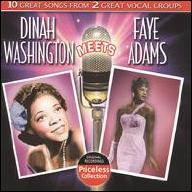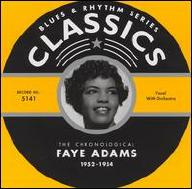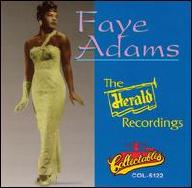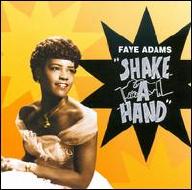The single went nowhere, however, and the Morris revue returned to the road. While in Montgomery, Alabama, the group recorded his gospel-inspired Shake a Hand, which Atlantic inexplicably declined to release -- Morris' contract soon expired, and he signed the group to Herald Records, re-recording Shake a Hand along with six other tracks at New York's Bell Sound studio. Herald chief Al Silver was so impressed he gave Tuell top billing, re-naming her Faye Adams in the process; issued in August 1953, the single topped the RB charts a month later, remaining there for eight weeks until it was knocked from its perch by the soundalike I'll Be True. Together the singles sold close to two million copies, and although Adams' third single, Every Day, failed to chart, she returned to the number one spot in mid-1954 with the devastating Hurts Me to My Heart. While Adams dreamed of crossing over to the pop charts, her penetrating ballads found little commercial footing as the first strains of rock roll took hold -- still, she left Morris' band to mount a solo career, joining the Rhythm Blues Show tour and appearing alongside the Drifters, the Counts and the Spaniels.
In early 1955, Adams recorded her fifth Herald single Anything for a Friend, its release coinciding with a week-long headlining stint at New York's renowned Apollo Theater. My Greatest Desire followed in the spring, but even though Adams remained a major live draw, her record sales were slipping fast, and two more 1955 releases, The Angels Tell Me and Same Old Me, failed to generate much commercial interest. That same year she also appeared in the motion picture #Rhythm Blues Revue, which premiered in Baltimore in early December; the Freed-penned +Teenage Heart opened in 1956, but Adams' next single, Taking You Back, did not surface until late summer. Although its follow-up, The Hammer, proved a regional smash in much of the northeast, she nevertheless parted ways with Herald, signing with Imperial to record Keeper of My Heart, a minor RB chart hit. I Have a Twinkle in My Eye soon followed, as did little-noticed efforts for Lido (I Waited So Long and That's All Right) and Warwick (I'm So Happy and Johnny, Don't Believe Her). After a last-ditch effort to court jazz audiences with 1962's Prestige release Goodnight, My Love, Adams walked away from secular music once and for all, returning to the gospel circuit and refusing to even discuss her classic RB sides during the decades to come. ~ Jason Ankeny, Rovi















